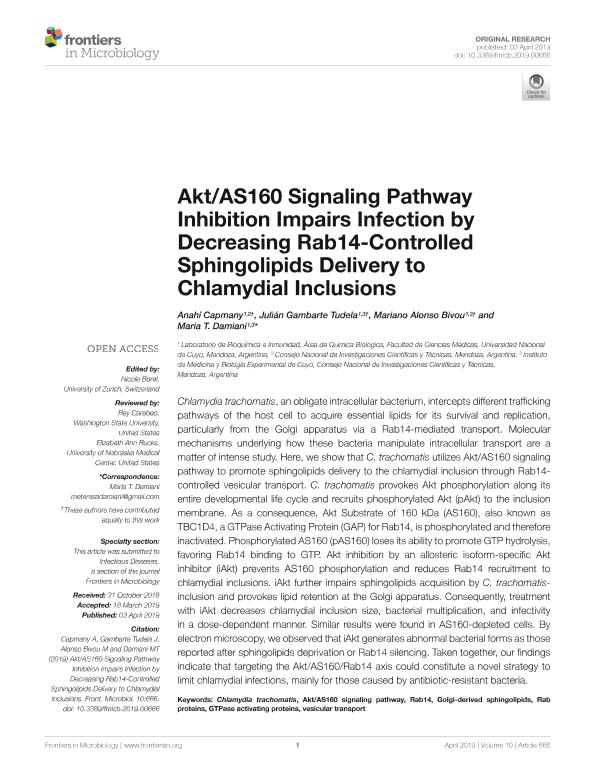Mostrar el registro sencillo del ítem
dc.contributor.author
Capmany, Anahi

dc.contributor.author
Abregú, Ángel Julián

dc.contributor.author
Alonso Bivou, Mariano Ángel

dc.contributor.author
Damiani, María T.
dc.date.available
2021-01-28T20:33:16Z
dc.date.issued
2019-04
dc.identifier.citation
Capmany, Anahi; Abregú, Ángel Julián; Alonso Bivou, Mariano Ángel; Damiani, María T.; Akt/AS160 Signaling pathway inhibition impairs infection by decreasing rab14-controlled sphingolipids delivery to chlamydial inclusions; Frontiers Media S.A.; Frontiers in Microbiology; 10; APR; 4-2019; 1-21
dc.identifier.issn
1664-302X
dc.identifier.uri
http://hdl.handle.net/11336/124078
dc.description.abstract
Chlamydia trachomatis, an obligate intracellular bacterium, intercepts different trafficking pathways of the host cell to acquire essential lipids for its survival and replication, particularly from the Golgi apparatus via a Rab14-mediated transport. Molecular mechanisms underlying how these bacteria manipulate intracellular transport are a matter of intense study. Here, we show that C. trachomatis utilizes Akt/AS160 signaling pathway to promote sphingolipids delivery to the chlamydial inclusion through Rab14-controlled vesicular transport. C. trachomatis provokes Akt phosphorylation along its entire developmental life cycle and recruits phosphorylated Akt (pAkt) to the inclusion membrane. As a consequence, Akt Substrate of 160 kDa (AS160), also known as TBC1D4, a GTPase Activating Protein (GAP) for Rab14, is phosphorylated and therefore inactivated. Phosphorylated AS160 (pAS160) loses its ability to promote GTP hydrolysis, favoring Rab14 binding to GTP. Akt inhibition by an allosteric isoform-specific Akt inhibitor (iAkt) prevents AS160 phosphorylation and reduces Rab14 recruitment to chlamydial inclusions. iAkt further impairs sphingolipids acquisition by C. trachomatis-inclusion and provokes lipid retention at the Golgi apparatus. Consequently, treatment with iAkt decreases chlamydial inclusion size, bacterial multiplication, and infectivity in a dose-dependent manner. Similar results were found in AS160-depleted cells. By electron microscopy, we observed that iAkt generates abnormal bacterial forms as those reported after sphingolipids deprivation or Rab14 silencing. Taken together, our findings indicate that targeting the Akt/AS160/Rab14 axis could constitute a novel strategy to limit chlamydial infections, mainly for those caused by antibiotic-resistant bacteria.
dc.format
application/pdf
dc.language.iso
eng
dc.publisher
Frontiers Media S.A.

dc.rights
info:eu-repo/semantics/openAccess
dc.rights.uri
https://creativecommons.org/licenses/by-nc-sa/2.5/ar/
dc.subject
AKT/AS160 SIGNALING PATHWAY
dc.subject
CHLAMYDIA TRACHOMATIS
dc.subject
GOLGI-DERIVED SPHINGOLIPIDS
dc.subject
GTPASE ACTIVATING PROTEINS
dc.subject
RAB PROTEINS
dc.subject
RAB14
dc.subject
VESICULAR TRANSPORT
dc.subject.classification
Farmacología y Farmacia

dc.subject.classification
Medicina Básica

dc.subject.classification
CIENCIAS MÉDICAS Y DE LA SALUD

dc.title
Akt/AS160 Signaling pathway inhibition impairs infection by decreasing rab14-controlled sphingolipids delivery to chlamydial inclusions
dc.type
info:eu-repo/semantics/article
dc.type
info:ar-repo/semantics/artículo
dc.type
info:eu-repo/semantics/publishedVersion
dc.date.updated
2020-04-24T17:55:06Z
dc.journal.volume
10
dc.journal.number
APR
dc.journal.pagination
1-21
dc.journal.pais
Suiza

dc.journal.ciudad
Lausanne
dc.description.fil
Fil: Capmany, Anahi. Universidad de Mendoza; Argentina. Consejo Nacional de Investigaciones Científicas y Técnicas; Argentina
dc.description.fil
Fil: Abregú, Ángel Julián. Consejo Nacional de Investigaciones Científicas y Técnicas. Centro Científico Tecnológico Conicet - Mendoza. Instituto de Medicina y Biología Experimental de Cuyo; Argentina
dc.description.fil
Fil: Alonso Bivou, Mariano Ángel. Consejo Nacional de Investigaciones Científicas y Técnicas. Centro Científico Tecnológico Conicet - Mendoza. Instituto de Medicina y Biología Experimental de Cuyo; Argentina
dc.description.fil
Fil: Damiani, María T.. Consejo Nacional de Investigaciones Científicas y Técnicas. Centro Científico Tecnológico Conicet - Mendoza. Instituto de Medicina y Biología Experimental de Cuyo; Argentina
dc.journal.title
Frontiers in Microbiology
dc.relation.alternativeid
info:eu-repo/semantics/altIdentifier/url/https://www.frontiersin.org/article/10.3389/fmicb.2019.00666/full
dc.relation.alternativeid
info:eu-repo/semantics/altIdentifier/doi/http://dx.doi.org/10.3389/fmicb.2019.00666
Archivos asociados
